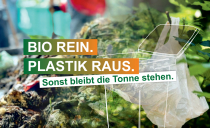New rules for the organic waste bin from 1 May 2025
29.04.2025
Imagine this: You pull your organic waste bin to the kerbside as usual - but the waste collection service just keeps on going. A red sticker on the lid signals: "Not emptied - incorrect filling!"
This could happen more often from 1 May 2025. This is because stricter rules will apply to organic waste bins with the new Organic Waste Ordinance. Anyone who does not separate their organic waste correctly risks having an empty bin.
What will change from 1 May 2025?
In order for organic waste to be turned into high-quality compost or environmentally friendly biogas, the waste must be as free of foreign matter as possible. New requirements will therefore apply from May:
- The proportion of foreign matter may not exceed 1 per cent. Even small amounts of plastic, glass or metal impair the quality of organic waste.
- Anyone who separates their waste incorrectly will be left with their waste.
The reason for these measures is clear: plastic, glass and other foreign matter make organic waste unusable. Only properly separated organic waste can be recycled.
What can go in the organic waste bin - and what can't?
Kitchen waste such as fruit and vegetable waste, coffee filters and tea bags, egg shells and food waste (not from restaurants) as well as garden waste such as grass, leaves and flowers are permitted.
All waste that is not biodegradable, such as glass and metal packaging, stones, nappies and toiletries, is not permitted. Organic waste should also not be thrown into plastic bags - not even those labelled as "compostable". They do not decompose properly during the composting process and therefore do not belong in the organic waste bin.
This keeps your organic waste bin clean and easy to empty:
- Wrap organic waste in kitchen paper or newspaper to reduce moisture. This also prevents it from sticking or freezing.
- Avoid plastic bags, even if they are labelled as "compostable". It is better to use organic paper bin liners.
- Place the bin in a shady spot to prevent odours from building up in summer.
Clean waste separation for a sustainable future
The new rules ensure better utilisation of organic waste and actively contribute to environmental protection. Anyone who fills their organic waste bin correctly not only avoids the hassle of disposal, but also supports a sustainable circular economy.
Every clean organic waste bin is a contribution to the environment - join in!
